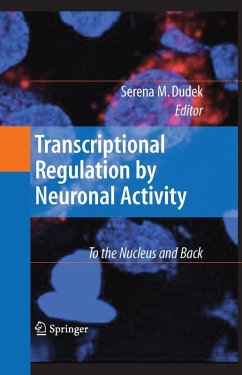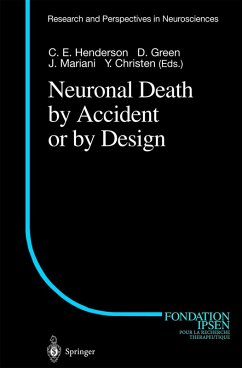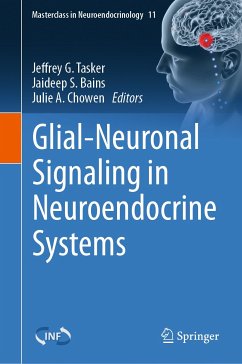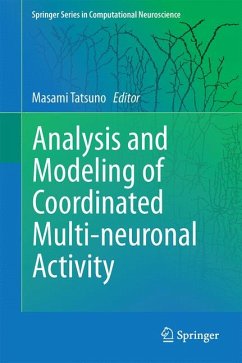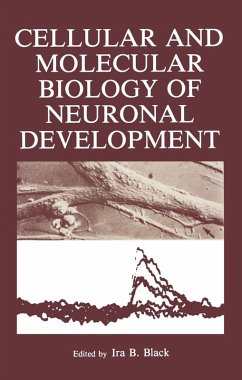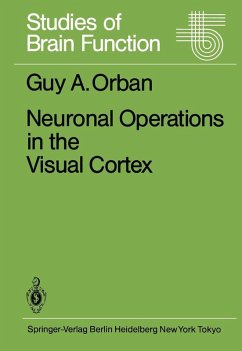
eBook, PDF
Transcriptional Regulation by Neuronal Activity (eBook, PDF)
To the Nucleus and Back
Redaktion: Saha, Ramendra N.; Dudek, Serena M.

PAYBACK Punkte
88 °P sammeln!





Transcriptional Regulation by Neuronal Activity (eBook, PDF)
Dieser Download kann aus rechtlichen Gründen nur mit Rechnungsadresse in A, B, BG, CY, CZ, D, DK, EW, E, FIN, F, GR, HR, H, IRL, I, LT, L, LR, M, NL, PL, P, R, S, SLO, SK ausgeliefert werden.
- Geräte: PC
- ohne Kopierschutz
- eBook Hilfe
- Größe: 39.49MB
- Text-to-Speech
- E-Mail des Verlags für Barrierefreiheitsfragen: accessibilitysupport@springernature.com
- Alle Inhalte über Screenreader oder taktile Geräte zugänglich
- Navigation über vor-/zurück-Elemente ohne Inhaltsverzeichnis
- Hoher Kontrast zwischen Text und Hintergrund (min. 4.5 =>1)
- Inhalte verständlich ohne Farbwahrnehmung
- Kurze Alternativtexte für nicht-textuelle Inhalte vorhanden
- Text und Medien in logischer Lesereihenfolge angeordnet
- Navigierbares Inhaltsverzeichnis für direkten Zugriff auf Text und Medien
- Keine Einschränkung der Vorlesefunktionen, außer bei spezifischen Ausnahmen
Ramendra N Saha, Ph.D., is an Associate Professor at the University of California (UC) Merced where he is also the co-director of the UC Merced Center for Interdisciplinary Neuroscience. Ramen did his post-doctoral training with Serena Dudek at the National Institute of Environmental Health Sciences, United States National Institutes of Health where he studied molecular mechanisms of activity-induced neuronal immediate early gene transcription. Now, his laboratory at UC Merced continues to study signaling and epigenetic mechanisms of excitation-transcription coupling. Ramen serves on the editorial board of Environmental Epigenetics. ORCID ID: 0000-0002-5494-2584 Serena M. Dudek, Ph.D., is a Senior Investigator and the Deputy Chief of the Neurobiology Laboratory at the National Institute of Environmental Health Sciences, United States National Institutes of Health. Her research focuses on the molecular and cellular mechanisms regulating synaptic plasticity in the developing nervous system to better understand how environmental factors shape the adult brain. Dr Dudek is best known for her early work on long-term synaptic depression (LTD) and pruning, regulation of neuronal gene transcription by action potentials, and synaptic plasticity in hippocampal area CA2. She serves on the editorial boards of Hippocampus and the Journal of Neuroscience. In addition, she is the recipient of the 2009 A.E. Bennett Research Award from the Society of Biological Psychiatry. ORCID ID: 0000-0003-4094-8368
Produktdetails
- Verlag: Springer International Publishing
- Seitenzahl: 595
- Erscheinungstermin: 12. November 2024
- Englisch
- ISBN-13: 9783031685507
- Artikelnr.: 72129766
Für dieses Produkt wurde noch keine Bewertung abgegeben. Wir würden uns sehr freuen, wenn du die erste Bewertung schreibst!
Eine Bewertung schreiben
Eine Bewertung schreiben
Andere Kunden interessierten sich für


